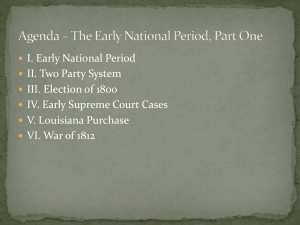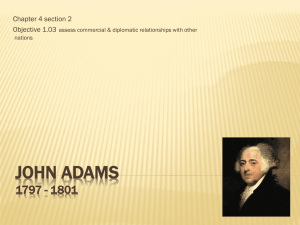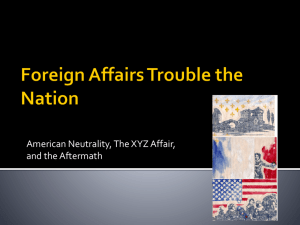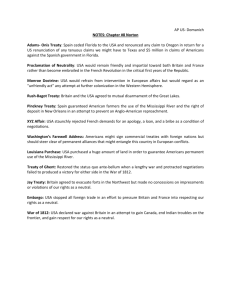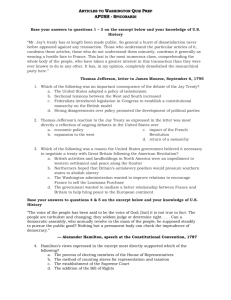Quasi War with France
advertisement
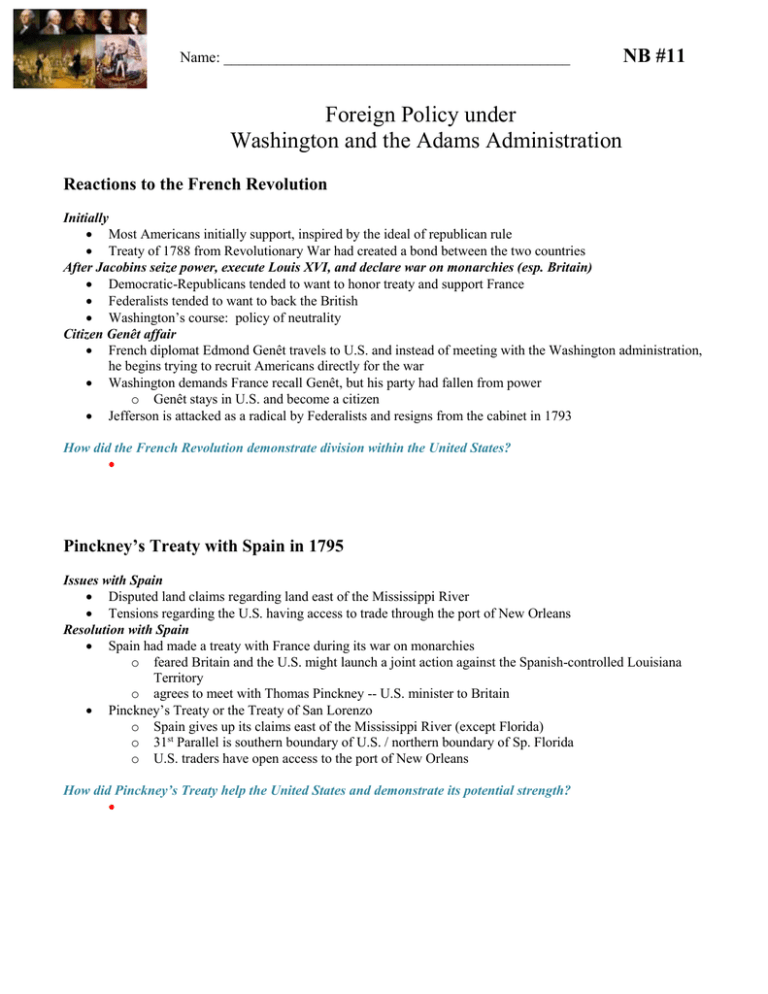
Name: ______________________________________________ NB #11 Foreign Policy under Washington and the Adams Administration Reactions to the French Revolution Initially Most Americans initially support, inspired by the ideal of republican rule Treaty of 1788 from Revolutionary War had created a bond between the two countries After Jacobins seize power, execute Louis XVI, and declare war on monarchies (esp. Britain) Democratic-Republicans tended to want to honor treaty and support France Federalists tended to want to back the British Washington’s course: policy of neutrality Citizen Genêt affair French diplomat Edmond Genêt travels to U.S. and instead of meeting with the Washington administration, he begins trying to recruit Americans directly for the war Washington demands France recall Genêt, but his party had fallen from power o Genêt stays in U.S. and become a citizen Jefferson is attacked as a radical by Federalists and resigns from the cabinet in 1793 How did the French Revolution demonstrate division within the United States? Pinckney’s Treaty with Spain in 1795 Issues with Spain Disputed land claims regarding land east of the Mississippi River Tensions regarding the U.S. having access to trade through the port of New Orleans Resolution with Spain Spain had made a treaty with France during its war on monarchies o feared Britain and the U.S. might launch a joint action against the Spanish-controlled Louisiana Territory o agrees to meet with Thomas Pinckney -- U.S. minister to Britain Pinckney’s Treaty or the Treaty of San Lorenzo o Spain gives up its claims east of the Mississippi River (except Florida) o 31st Parallel is southern boundary of U.S. / northern boundary of Sp. Florida o U.S. traders have open access to the port of New Orleans How did Pinckney’s Treaty help the United States and demonstrate its potential strength? Issues in the Ohio Valley / “Old Northwest” British Forts Britain still maintained forts in the Northwest Territory o Violation of Treaty of Paris of 1783 (ended Revolutionary War) Conflicts with Native Americans Native Americans demanded direct negotiations with U.S. government British encourage resistance by Native Americans U.S. tries to seize control First army sent out by Washington defeated in 1790 by a confederacy of Native American tribes led by Little Turtle, chieftain of the Miami tribe o Little Turtle then thoroughly defeats another army in 1791 Washington appoints General Anthony Wayne to lead federal troops o “Mad Anthony” trains his troops for a year in the west o Little Turtle then urges peace and is replaced Battle of Fallen Timbers (1794) o Wayne decisively defeats the Miami Confederacy o Builds fort within miles of British Fort Miami o Miami Confederacy signs the Treaty of Greenville Give up most of Ohio in return for $20,000 in goods and $10,000 per year How did the issues in the Ohio Valley point to additional conflicts outside the area and in the future? Jay’s Treaty with Britain in 1794 Issues Britain still maintained forts in the Northwest Territory and aided Native Americans Britain had seized nearly 250 American trade ships during its war with France o Britain had captured many U.S. sailors and forced them to work for Britain – impressment Issues regarding debts from Revolution (to British merchants and American slave owners) Issues regarding open trade between U.S., Britain, and British lands in the Caribbean Reasons for Resolution Britain wanted to keep U.S. from allying with France again in its war with Britain News of Wayne’s victory in the Battle of Fallen Timbers Britain agrees to meet with U.S. Chief Justice John Jay Terms of the Treaty Britain would evacuate its forts in U.S. territory Britain must compensate American traders for lost goods Britain does not have to compensate for lost slaves U.S. gains limited trade access to the Caribbean U.S. must repay British merchants for debts from the Revolutionary War U.S. agrees to favored nation trading status with Britain, bypassing France Reaction to the Treaty Treaty is unpopular with large parts of the nation – U.S. appears to have given up too much Jefferson and Madison angered by favoritism toward Britain use to drum up support for DemocraticRepublicans o This is one of the first national issues of campaign divide between the Federalists and DemocraticRepublicans John Jay retires as Chief Justice after being scolded throughout the country Treaty is passed after bitter debate What issues did Jay’s Treaty attempt to solve? What appears to be the legacy of Jay’s Treaty? Election of 1796 Background Washington will not run for third term Federalists were dominant party, but hurt by unpopularity of Jay’s Treaty Republicans hurt by supporting actions of French ambassador Republican Candidates Jefferson was uncontested candidate, Aaron Burr (NY Senator) as VP Federalist Candidates Hamilton was strongest Federalist, but had too many enemies Washington’s VP, John Adams, chosen as nominee Thomas Pinckney of SC chosen as running mate Hamilton and many southerners support Pinckney over Adams Jumbled Results of 1796 Electoral College originally worked that person that received most votes would become president and the person that came in second would become vice-president o Founders when writing the Constitution did not originally envision people running as political parties Federalists split regionally, with Adams receiving most electoral votes Jefferson receives second most votes due to non-votes for Pinckney Federalist Adams becomes president and Republican Jefferson the VP Last/only presidential victory for Federalists What makes the Presidential Election of 1796 unique? Quasi War with France Background US relations worsen with revolutionary France France captures US trade ships and crews France refuses Federalist Charles Pinckney as US representative Some push for war, but Adams decides to negotiate XYZ Affair Bipartisan commission sent to France (Federalists C. Pinckney and John Marshall and Republican Elbridge Gerry) Three French agents of foreign minister Prince Talleyrand demand loan for France and personal bribe Pinckney refuses and Adams begins urging for war French officials referred to as Messrs. X, Y, and Z in published report which gains support for war o VIDEO ---- https://www.youtube.com/watch?v=ZyuZRcxpCKM Quasi War US fights a form of undeclared war against France US cuts of trade and treaties from 1778 Creation of Dept. of Navy and building of warships US captures 85 French ships and cooperates with Britain Conclusion France wants to negotiate under new leader, Napoleon Ends “perpetual” alliance with France from 1778 Establishes new trade relations with France Federalists strengthened in Congress due to support of war What are the major elements of the legacy of the XYZ Affair and the Quasi War? Partisan and Nullification Conflicts Background Now stronger, Federalists want to lessen opposition by Republicans Alien Act Increased time for naturalization for citizenship Authorizes president to depose dangerous aliens or those whose country the US is at war with Adams never deports any aliens, but immigration is discouraged and some foreigners leave US Sedition Act Government can prosecute those committing “sedition” (libelous or treasonous activities -- "false, scandalous, and malicious writing" against the government) Republicans view as attempt to stifle any opposition No major effort made against Republicans, but 10 men convicted (most were Republican newspaper owners) Virginia and Kentucky Resolutions Republican leaders hope to counter Alien and Sedition Acts through state legislatures Argues these powers against 10th Amendment Jefferson drafts KY Resolution and Madison the VA Resolution Claim ability of states to nullify federal laws (Nullification and Interposition) Adopted by both states, but unable to win national support Consequences Nation becomes deeply politically divided Fight in House of Reps between Roger Griswold (CT (F) cane) Matthew Lyon (VT (R) tongs) Election of 1800 will be bitter, divisive, dirty, and campaigned o VIDEO -- https://www.youtube.com/watch?v=guurFhe4pZ8 What appear to be the major challenges to American ideals present in the Alien and Sedition Acts? What major challenges to the federal government and national unity do the Virginia and Kentucky Resolutions put forward?

